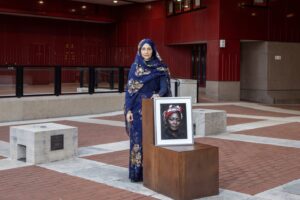Ngũgĩ wa Thiong’o, the great Kenyan novelist, playwright, and theorist who revolutionized African literature by centering indigenous languages and challenging colonial legacies and published 32 books, has died at the age of 87. His daughter Wanjiku wa Ngũgĩ’s made the announcement on Facebook:
It is with a heavy heart that we announce the passing of our dad, Ngũgĩ wa Thiong’o, this Wednesday morning, May 28 2025. He lived a full life, fought a good fight. As was his last wish, let’s celebrate his life and his work. Rîa ratha na rîa thŭa. Tŭrî aira.
The Ugandan site Nile Post reports that he died in California, USA, following complications from kidney failure. His health had been declining in recent years, according to the BBC. He underwent triple heart bypass surgery in 2019 and had kidney failure, and had previously survived prostate cancer in 1995, when doctors gave him only three months to live.
Born James Ngũgĩ on January 5, 1938, in Kamiriithu, Kenya, he rose to prominence with his debut novel Weep Not, Child (1964), the first major English-language novel by an East African writer. His subsequent novels came closely after: The River Between in 1965 and A Grain of Wheat in 1967. Like the novels of Chinua Achebe, who had been his publisher and mentor earlier in his career, Ngũgĩ’s explored the complexities of colonialism and its aftermath. With Achebe and Wole Soyinka, Ngũgĩ would come to be regarded as part of an unofficial trinity: the continent’s greatest pioneering writers.
In 1977, Ngũgĩ co-authored the play Ngaahika Ndeenda (I Will Marry When I Want) in Gikuyu, which led to his imprisonment by the Kenyan government. During his incarceration, he resolved to abandon English in favor of writing exclusively in Gikuyu, a decision he articulated in his seminal essay collection Decolonising the Mind (1986). “Language, any language, has a dual character: it is both a means of communication and a carrier of culture,” he writes in the book. “Take English. It is spoken in Britain and in Sweden and Denmark. But for Swedish and Danish people English is only a means of communication with non-Scandinavians. It is not a carrier of their culture. For the British, and particularly the English, it is additionally, and inseparably from its use as a tool of communication, a carrier of their culture and history.”
Exiled from Kenya in 1982, Ngũgĩ continued his advocacy for linguistic and cultural decolonization from abroad, holding academic positions in the United States, including at the University of California, Irvine. He once said, “I don’t think anybody who has gone through a colonialist system can claim to be free of the effects of the colonial. All we can do is continue to fight against those tendencies. Scars on the mind take a long time to heal.” He put it differently elsewhere: “Resistance is the best way of keeping alive.”
His later works, including the novels Devil on the Cross (1980) and Wizard of the Crow (2006), combined satire and allegory to critique neocolonialism and authoritarianism. Wizard of the Crow earned him the 2008 Tähtifantasia Award for the best foreign fantasy novel released in Finland in 2007. In 2021, his book-length prose poem The Perfect Nine: The Epic of Gĩkũyũ and Mũmbi, written in Gikuyu and self-translated into English, was longlisted for the International Booker Prize — the first book in an African language to be nominated as well as the first person nominated as both author and translator of the same work. In 2022, he received the PEN/Nabokov Award for Achievement in International Literature, with the judges calling him “a transformative figure.” Across 63 years, he published full-length works in every genre except poetry, a total of 32 books and monographs.
Authors have taken to social media to write him tributes. “I first met Mzee Ngugi in South Africa in 2007, and was understandably starstruck. He was warm and lovely, and allowed me to disagree with him to some extent on the question of what language African writers should write in. An Iroko has fallen. Ga na udo,” writes Chika Unigwe on her X account.
There is a #RIPMwalimu trend on X. “Mwalimu” is Swahili for “teacher.”
“He was probably my first encounter with literary fiction,” said Open Country Mag editor Otosirieze. “I found a coverless book and sank into the story of a boy named Njoroge in rural Kenya. The scenes are still fresh in my memory: plant leaves falling across his body as he walked on the road. Years later, I learned that the book was Weep Not, Child. And the publication of that book is momentous in more ways than we talk about. Ngugi was only 22 and had published two short stories when he was invited to the Makerere Conference in 1962, where he met Chinua Achebe and gave him a copy, and Achebe published it. The generosity and effusive intellect of that first generation of postcolonial African writers — the way that Ngugi in particular stuck to his language convictions even against hostile responses, his belief in the power of the indigenous experience — is what today’s writers, we who survive his and their work, must emulate if our work, and the industry, is to regain significance outside literature. I hope that the writers who mourn and celebrate him now understand exactly what his work means. May he rest in power.”
Ngũgĩ’s legacy is his steadfast commitment to African languages and his belief in the power of storytelling to effect social change. He is survived by his wife, Njeeri, and several children, including writers Tee Ngũgĩ and Wanjiku wa Ngũgĩ. ♦






One Response
RIP Great Africa writer! You are cherished and it will continue from Generation to Generation.
Regards,
C. Amponsah